Momma, See My Wisdom Tooth
The bees do it, the birds do it. But bringing up metrosexual parents today is not that simple.
She had so many children, she didn’t know what to do.
She gave them some broth, without any bread,
Whipped them all soundly, and sent them to bed.
That was then. Meet the parents now. Mahmood M. Ashraf, 37, and his wife Qanita Nishat, parents of two schoolgoing kids from Bangalore, got their parenting styles vetted by an expert by the time their son was five. And Ashraf found they needed to scold their kids much less for lapses like breaking a cup or spilling things. He can now explain to his son that by being careful, money can be saved for more satisfying pursuits. Ashraf’s perspective of parenting is new—he can discipline his kids more effectively and enjoy their company a lot more too.
Welcome to the world of New Parenting, where every parent wants to know more and do it better. Consult experts, rather than rely on common sense and instinct. Read and surf the web, don’t just rely on conventional wisdom. Shelja Sen, Delhi-based family therapist, finds that for new-age moms and dads, parenting is a great effort to make things better for their kids: "People are more aware of their child’s needs and want to get it right. Parenting now is more about being, rather than doing."
New Parenting spans a range from serene Art of Living converts meditating towards parental bliss, to paranoid tutorial junkies. Parents learned a few tough lessons in the pushy ’80s and ’90s; the incidence of childhood depression, and suicide, soared. A new generation of parents is working out how to bring up kids without losing its sanity.
Workshops have become classrooms for parenting. Etishree Bhati, counselor at DPS, RK Puram (Delhi), says she takes up to 30 workshops for parents in a year. Counselling costs Rs 500 to Rs 1,200 an hour in metros like Delhi and Mumbai and anywhere between Rs 250 and Rs 300 in Calcutta and Hyderabad.
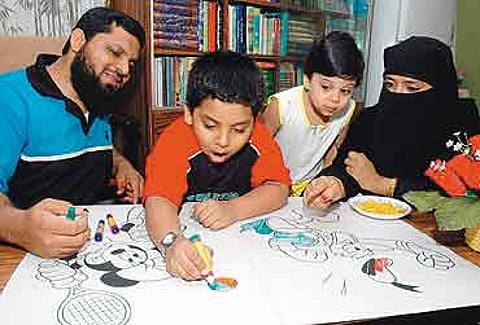
the Ashrafs Bangalore: "We consulted an expert on parenting when our son was five. Now we scold our kids less often."
Not surprising then that iim grad Ratnesh Mathur dropped out of the corporate mainstream to start Genie Kids, a resource centre for child development and parental guidance in Bangalore. Says Mathur, "Parents want out-of-school programmes that help build self-esteem. Parents who would question the necessity for workshops that teach them how to raise their children better often come back later and say they are relieved to transfer responsibility to the child to empower him."
Though parenting literature has always been popular, interactive forums attract most newbie parents. More than 50,000 users log on to indiaparenting.com every day to find answers to questions on issues ranging from children’s illnesses and diets to discipline and studies.
Nirali Sanghi, a former banker who set up the site, mentions many regulars who earnestly attend parenting seminars and classes. "There are more nuclear families, single parents and families that keep moving for work these days. They prefer formal help in child raising." Also, some genuinely clueless ones need the tips. "I have a recipe for khichdi on my site that is hugely popular—many mothers are greenhorns."
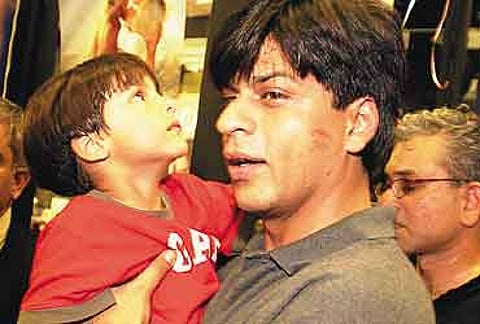
Shahrukh Khan and son, Aryan SRK is there when his kids want him. After school, at PTAs, b’day bashes. Whenever. Wherever.
Often, support groups are now friends and friends are support groups. "Twenty years ago the space that would have been filled by families is now being filled by friends, who are informal, non-judgemental and don’t dole out advice unless asked," says Vandana Bakshi Shah, who runs 360 degrees, Back to Life, a support group for second-time singles in Mumbai.
Exit family, grandparents; enter support groups, park and neighbourhood sororities. Sheena Misra, a child therapist from Calcutta and the parent of a six-year-old, says she and her friends take turns minding their kids over the weekends."A few Sundays back I had invited my friends’ kids over to spend the day with us, more recently another friend took the kids out for a movie, this allowed the children to have fun and their parents some time to themselves".
But the real bonding begins at home. Attachment parenting is the new mantra, though the West and urban Indians once ignored it. Babies born in the seventies and up to early nineties were taken off to a nursery soon after birth. Too much attention to the child was thought inappropriate. It now transpires that mothers who kept their babies with them throughout, many of them underprivileged, were actually practising what is now considered cutting-edge parenting. Says Sen: "There can never be too much love, too much attention, too much cuddling or body contact with your child."
Some baby-friendly hospitals and nursing homes already encourage it. Recalls Nupur Sinha, who delivered her baby in a Bangalore hospital: "As soon as the baby was born, he was left on my body for contact. I was encouraged to hold and touch him and play with him as often as I could."
Explains Sen: "Research shows children brought up with attachment parenting are emotionally and socially healthier and show greater leadership qualities." Pundits once preached the "let the baby cry" mantra. Today they advise parents to "pick up a child every time it cries, allow maximum body contact, hugs, kisses, cuddles and stimulation of the five senses."
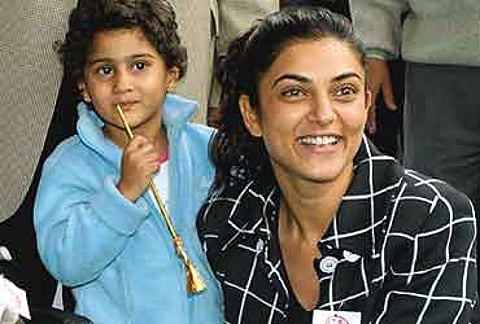
Sushmita Sen and her daughter, Renee Mum Sush takes Renee to her shoots often. "I’ve re-learnt all the poems I did in school."
It’s not only mum who is catching up on all this old/new parenting techniques. Roles have even been reversed in some cases, in others the father has moved centrestage along with mum. New age dads are now doing just about everything except breast-feeding. Mums are travelling, working late, paying the bills and being good companions. Says Sanghi: "Nearly half the users on my site are fathers. They all want to know more and be involved in bringing up their children."
Take graphic designer Naveen Shiromani, 36, who says his home and relationship had gone for a "six" two years ago when both he and his wife worked full time and travelled non-stop. "Today my primary responsibility is home and my daughter, I work out of home while my wife does the full time job," he says.
Explains Dr Amit Sen, clinical psychologist for adolescents, and an involved father: "Family structure is changing, women expect more from their husbands, but more importantly, fathers choose to participate because they find it gratifying."
The screen image of the father reflects this changeover. Ad-dads are now family-oriented with high emotional quotients. They cook and wash and miss flights to catch pizza with the family. But as Rachna Johri, a psychology teacher from Delhi’s Lady Sri Ram College, cautions: "The media is creating stereotypes, where the father’s involvement is glamorised. Do you remember a single ad where the father is squatting on the floor and scrubbing dirty clothes? Unlikely."
Meanwhile, says Rajat Mitra, who runs Swanchetan, which treats trauma-hit children: "The balance of power has shifted—in favour of the child. Google has done to parents what Guttenberg’s printing press did to priests." So we find Vikas and Smita Agarwal, parents of a 13-year-old girl, trying to figure out what she knows of the world from the books she’s reading, by being friends with her friends and their parents and by getting regular updates from the teachers in school.
Many parents may today be less paranoid about academics than they used to be. "There is a definite effort to recognise multiple intelligence rather than obsess over academic milestones now," says Shelja Sen."If a child was weak in maths, parents in the past would drag the child for tuition and be worried sick about the problem. Now, parents recognise the importance of focusing on any other faculty (say music, or art) and use it to motivate the child." But, as Dr Jitender Nagpal of VIMHANS, Delhi, explains, "In their anxiety to provide for the child, parents may arrange too many structured activities. Unstructured time is very important for children".
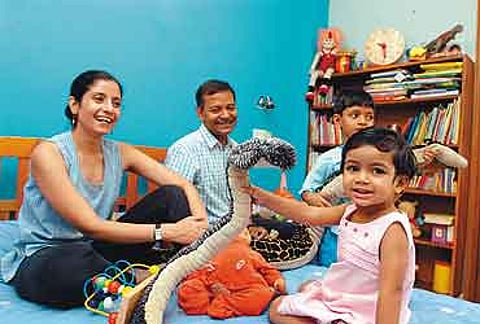
the Sens New Delhi: "Research shows children brought up with attachment parenting are emotionally stronger."
In fact, many parents still commit the original parenting sin: live out their own dreams through their children. Listen to Sharmila Bhaktaram, mother of Vaibhav, seven and Rishika, four: "I was having problems motivating my son to stay with his tennis classes but attending a workshop made me realise that tennis was my interest, which I was foisting on the kid, while he was interested in cricket." She says managing and understanding small, everyday instances on how to deal with temper tantrums, how to say "no" to your kid, how to focus on what the child needs and not what you think they need are her biggest gains from parenting classes.
Even so, balancing out love and discipline remains a challenge. A teenaged girl who was good at western music was gently advised by a teacher to build up a base in Indian classical music. Her response: she slashed her wrist in school and blamed the teacher for "pressuring" her. It turned out her parents had been asking her to take Indian classical lessons, which she detested.
Says Bhati: "A lot of children emotionally blackmail their parents like this and wrist-slashing has become rampant in elite schools in Delhi. We help parents to be firm and help them on how to discipline kids."
Many counsellors say that discord between parents arises out of situations where one or both parents are reluctant to take tough decisions, and pass the buck. "They are scared of losing the child’s affection or disappointing him, while the child takes advantage of this," says Bhati.
Some parents still have the problem of dealing with their own rage and end up spanking children. "Beating up is not an option. Not even a little bit," points out Amit Sen, "Just like a bit of paedophilia or a bit of minority abuse isn’t." Mitra mentions German psychoanalyst Alice Miller’s study of extremely violent adults which found that many of them were victims of abuse as children. This has led to some harsh legislation, particularly in Scandinavia, where parents can go to jail for smacking a child. Johri, however, says that this needs to be seen within a cultural context: "In the West, the parent-child relationship is quite different. If parents here do so much for a child, a whack on the bottom should be seen as part of the package."
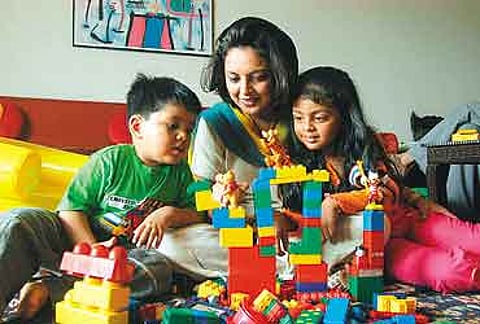
the Sanghis Mumbai: "There are nuclear families, travelling parents. They prefer formal help in child-raising."
Vinod Chebbi, a Bangalore-based counsellor, identifies another source of trouble: "Behavioural problems come from anxiety on the part of the parents to see their child excel, succeed or just cope with today’s competitive environment. And as couples opt for two or even a single kid, the need to foist all their expectations on that one kid increases". He says sometimes the issue is worsened by parents competing with each other to win the child’s favour, so if one parent tries to discipline the child, the other often undermines the effort by constantly giving in to the child’s wishes.
The issue before many parents is whether to bring discord into the open or not. "I do not think it is unhealthy for the child’s psyche if the parents quarrel.It is not possible for any married couple to live in complete agreement. My advice is that if you do quarrel in the child’s presence, also make up before them.This completes the circle and the child’s psyche has greater clarity," says Chennai-based psychotherapist Vijay Nagaswami.
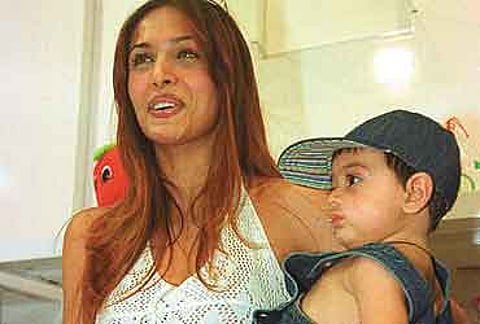
Malaika Arora Khan with son, Arhaan She has found a wonderful way of both working hard and enjoying the joys of parenthood.
New research also reveals that the foundation of a child’s mental health is the quality of parenting and not whether the mother is at home or not.In some cases, mothers who work end up raising more well-adjusted children."Children of working parents are certainly independent in their attitude and can be achievers, but children with less parental attachment tend to be less compassionate individuals," says Bhawani Jaishankar, teacher, Sri Sankara Senior Secondary School, Chennai.
Single parents also face special problems. Mamta Govil, a special educator at Delhi’s British School, is a single woman who recently adopted a daughter.Govil feels the system needs to be sensitised towards single parents and on their part they too should watch against being over-protective.
But the real reason for rising single parenthood is the increasing rate of divorce. "This imposes its own set of parenting challenges," says Bakshi Shah. In fact, parental alienation syndrome is a new problem facing parents and divorce lawyers. This can show up in a child during a conflict situation between the parents, where one parent is alienated from the child, usually by the other. Courts abroad (and in one case in India) have started recognising this. Says Nandita Rao, Delhi-based lawyer: "There is great reluctance on the courts’ part to send such children for counselling, but hopefully things will change."
Adoption, meanwhile, throws up the tough question of how and when to tell the child that he/she is adopted. Vasanth Kumar and Nimmu have one biological and one adopted child. They concede that adopted children can be emotionally insecure and it takes effort and patience to reinforce positive attitudes in the child. The story of Krishna and Yashoda remains a favourite for many adoptive parents. "None of us know where we all come from. Even your mother and father came from different backgrounds and have put a happy family together," is what Nimmu tells her children.
A far cry from the woman in the shoe, isn’t she?
By Sanghamitra Chakraborty with Saumya Roy, Lata Khubchandani in Mumbai, Archana Rai in Bangalore, Vatsala Kamat in Chennai
Tags